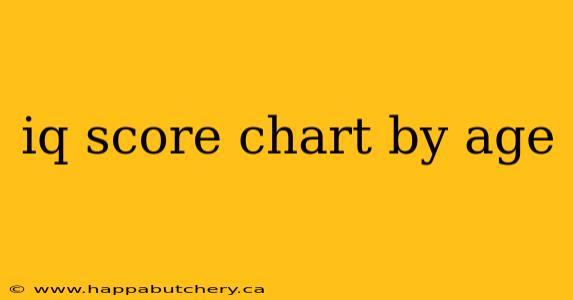IQ Score Chart by Age: Understanding Your Score
IQ, or intelligence quotient, is a measure of cognitive abilities relative to the general population. It's often used to assess intellectual potential and can be helpful in understanding learning styles and educational needs. But how do IQ scores change with age, and what does your score mean?
What is an IQ Score?
IQ scores are typically standardized with an average of 100 and a standard deviation of 15. This means that 68% of the population falls within the range of 85 to 115, with scores below 85 considered below average and scores above 115 considered above average.
Here's a breakdown of IQ ranges and their interpretations:
- Below 70: Considered intellectually disabled, requiring specialized support.
- 70-85: Below average.
- 85-115: Average range.
- 115-130: Above average.
- 130-145: Gifted range.
- Above 145: Highly gifted or profoundly gifted.
How IQ Scores Change with Age
IQ scores are generally considered stable throughout adulthood. However, children's IQ scores can change with age. Here's why:
- Cognitive Development: Children's brains are still developing, and their cognitive abilities are constantly evolving.
- Learning Experiences: Exposure to different learning experiences and educational opportunities can influence a child's IQ.
- Testing Methods: Different IQ tests are designed for different age groups, and the interpretation of scores may vary.
IQ Score Chart by Age
Note: This chart is a general guideline and may vary depending on the specific IQ test used.
| Age | Average IQ Score |
|---|---|
| 2 Years | 85-115 |
| 3 Years | 85-115 |
| 4 Years | 85-115 |
| 5 Years | 85-115 |
| 6 Years | 85-115 |
| 7 Years | 85-115 |
| 8 Years | 85-115 |
| 9 Years | 85-115 |
| 10 Years | 85-115 |
| 11 Years | 85-115 |
| 12 Years | 85-115 |
| 13 Years | 85-115 |
| 14 Years | 85-115 |
| 15 Years | 85-115 |
| 16 Years | 85-115 |
| 17 Years | 85-115 |
| 18 Years | 85-115 |
| Adults | 85-115 |
What Your IQ Score Means
Your IQ score is just one piece of the puzzle when it comes to understanding your overall intelligence. Other factors such as emotional intelligence, creativity, and practical skills are also important.
Here are some points to remember about IQ scores:
- Not a definitive measure: IQ scores are not perfect indicators of intellectual ability, and they don't tell the whole story.
- Environmental factors: IQ scores can be influenced by environmental factors such as access to education, nutrition, and socioeconomic status.
- Individual differences: Everyone learns and develops at their own pace, and IQ scores should be interpreted in context.
Conclusion
While IQ scores can provide a snapshot of cognitive abilities, it's essential to consider them within the broader context of individual development and potential. Remember that IQ is just one aspect of a complex and multifaceted human being.
